Southeastern STEM Education Research Conference
The Southeastern STEM Education Research Conference assembles great minds engaging
in conversations about empirical studies in STEM education and their applications
to practice in K-20 learning environments.
The 18th annual in-person event is on Friday and Saturday, January 12-13, 2024, at the Middle Tennessee State University campus in Murfreesboro, TN. The conference
will include addresses from national leaders in STEM education research, visual and
oral presentations, and informal sessions to support collaborations.
Goals:
- Share methods, data, and current research questions within disciplinary and interdisciplinary
STEM contexts
- Facilitate discussions between researchers and educators
- Encourage local, state, and national STEM education collaboration and partnerships
- Develop improved teaching methods for STEM topics
- Produce networking opportunities across stakeholder communities
Parking Map
View the 2024 Program by clicking below!
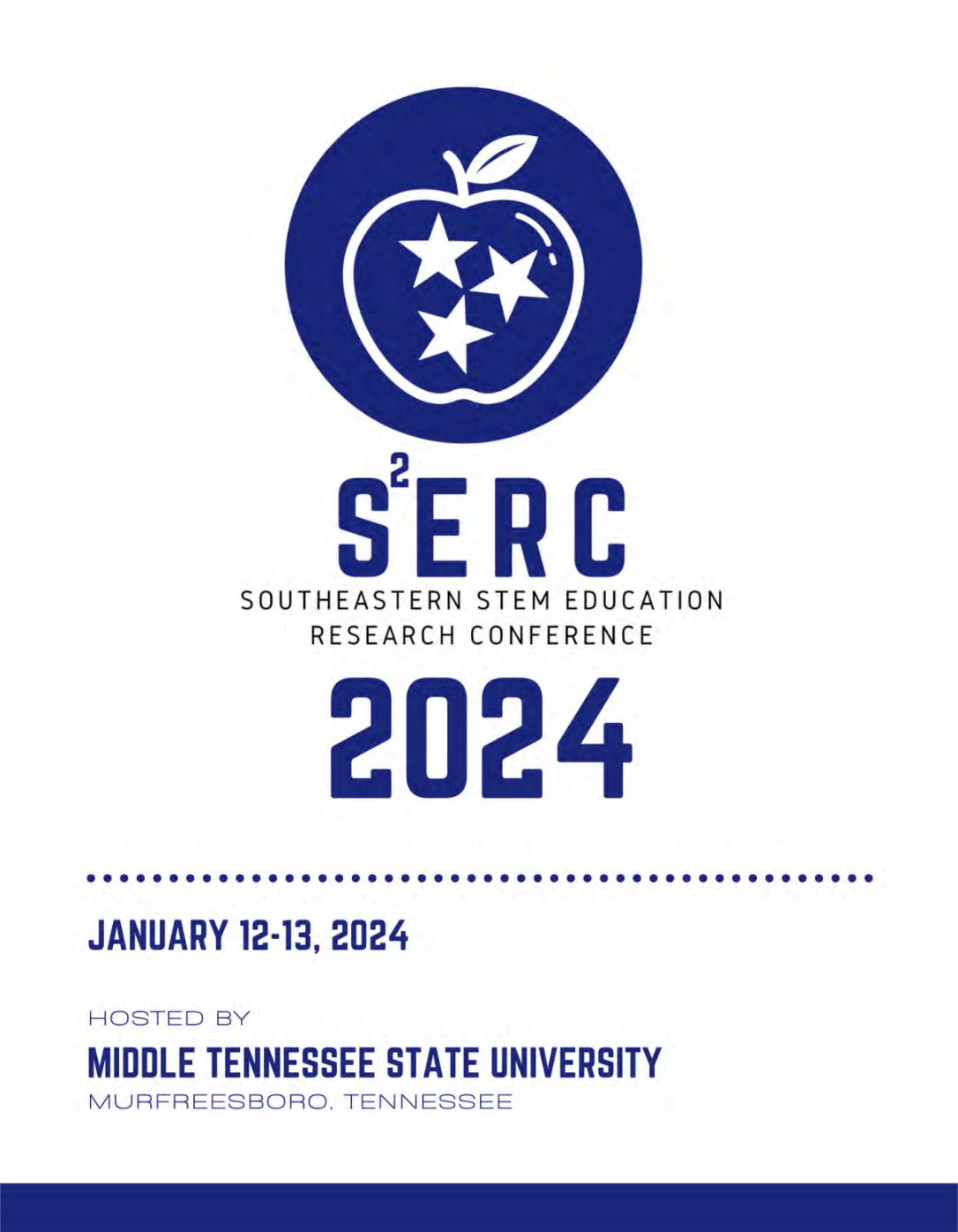
View Program
View Schedule
Meet the Keynote Speaker: Dr. David E. Drew
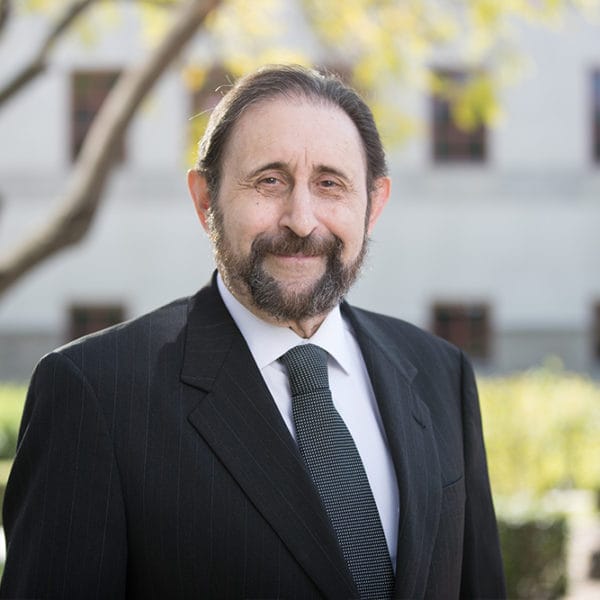
David E. Drew is a Professor of Education at Claremont Graduate University in Claremont, California and
holds the Joseph B. Platt Chair in the Management of Technology. His principal appointment is in the School of Educational Studies, where his teaching
focuses on quantitative research methods, statistical techniques, and data analytics.
For ten years Dr. Drew served as dean of the School of Educational Studies.
Dr. Drew's research interests focus on social justice and STEM (Science, Technology, Engineering,
and Mathematics). His work addresses discriminatory barriers that prevent many marginalized
students from accessing STEM courses. Working with school districts, colleges, and
universities on programs that remove those barriers and facilitate both student access
and student success. His book, STEM the Tide was published by Johns Hopkins University Press. He also conducts research in and
writes about topics in higher education, technology, and public health.
Prior to joining the CGU faculty, he held senior research positions at the Rand Corporation,
the National Research Council, and the American Council on Education. Previously he
had held a research faculty position at Harvard University, from which he received
his PhD, and served as head applications programmer at the Harvard Computing Center.
He is the author of more than 200 publications, including 10 books, about the improvement
of mathematics and science instruction at all levels of education, the development
and evaluation of effective undergraduate programs, building strong university research
programs, and health education.
SSERC 2024 Early Career Panel - Subcommittee
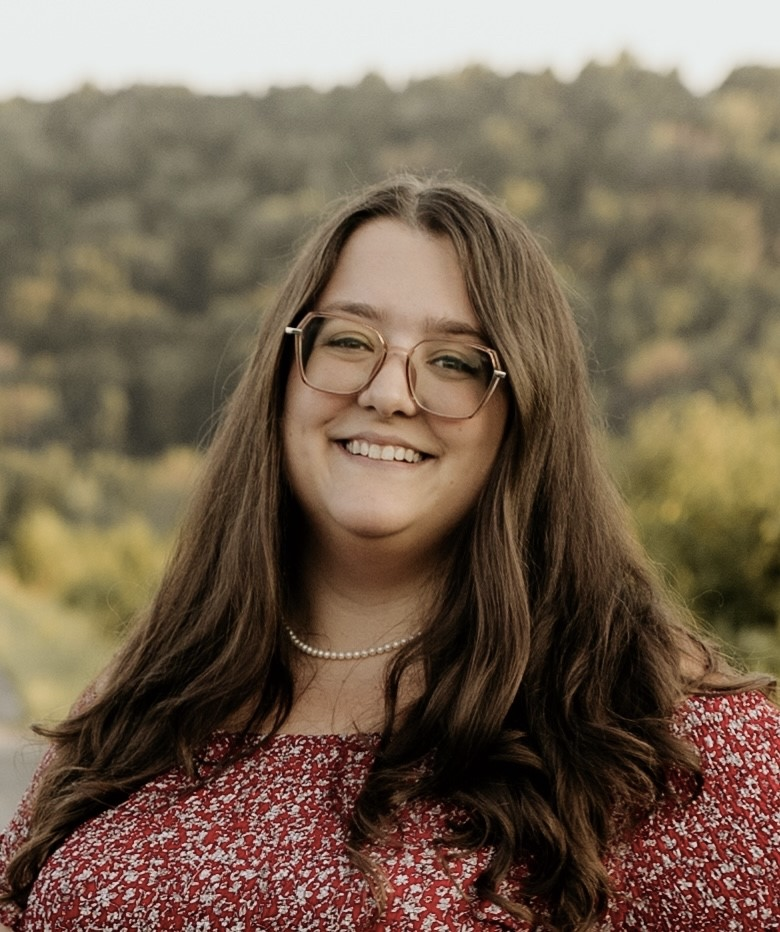
Samantha Fletcher, PhD Student, Mathematics Education, MTSU
Samantha is a doctoral student in Mathematics and Science Education, in the Mathematics
Education concentration. She has prior degrees from Tennessee Technological University in Curriculum and Instruction
(MA), and Secondary Education (BA). Her research interests are mathematics identity,
rural education, and secondary mathematics education.
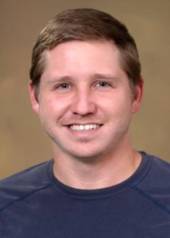
Trevor Chapman, PhD, Lecturer, Department of Biological Sciences, ETSU
Trevor Chapman received his PhD in Biomedical Sciences with a concentration in Physiology
in 2022 from East Tennessee State University. Currently, he is a lecturer and researcher
in the Department of Biological Sciences at ETSU. He teaches several sections of introductory
biology I and II, supervises introductory and biochemistry laboratories, and is constructing
a course on critical analysis and statistics. He co-advises several graduate students
in amphibian conservation research, and is passionate about getting undergraduates involved in research.
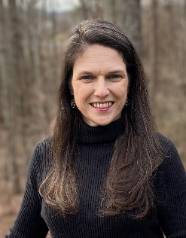
Alyssa Mullins, recent PhD graduate in Exceptional Learning in STEM Education, TTU
Alyssa Mullins earned her PhD in 2023 in Exceptional Learning with a focus in STEM Education from Tennessee Technological
University where she researched characteristics of effective teaching and conducted
program evaluation. She has master’s degrees in Instructional Leadership from Tennessee State University,
Curriculum and Instruction from Tennessee Technological University, and Education
from the University of Tennessee at Chattanooga. Alyssa taught Chemistry for several years at the high school level and is currently
the Dean of Students at Sequatchie County High School.
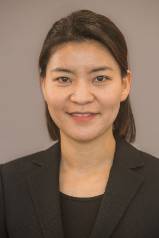
Eunsung Park, PhD, Assistant Professor, Learning Design and Technology, TTU
Eunsung Park is an Assistant Professor of Learning Design and Technology at Tennessee Tech University. Her research focuses on personalized
learning in advanced technology learning environments (i.e., adaptive learning, learning
analytics, virtual reality, gamification), instructional design, and computational
thinking. Park has taught course design and development in distance education, technology
effectiveness in the workplace, computer programming, engineering MOOC, and computational
thinking for higher education in addition to eight years of teaching K-12 computer
science.

Katy Hosbein, PhD, Assistant Professor, Chemistry, MTSU
Dr. Katy Hosbein is an Assistant Professor of Chemistry at Middle Tennessee University.
Her current research projects aim to better understand how students develop a science
identity by utilizing equity-centered research methods in Chemistry Education Research. She has a Masters degree in Chemistry, where she studied the diagnosis of protective coating quality
on sculptures using non-destructive techniques. Dr. Hosbein earned her Ph.D. in Chemistry
in 2019 from Portland State University where she researched aspects of student science
and chemistry identity within general and organic chemistry courses. She then completed two postdoctoral fellowships, one at East Carolina University,
where her research focused on assessing student competence in scientific practices
through Argument-Driven Inquiry, and the other at the University of Michigan, where
she investigated the implementation of culturally relevant education by teachers within
an Indigenous community in Alaska.
Registration - CLOSED
S2ERC Registration opens October 16th and closes on December 20th, 2023
Presenters and Participants must register to attend.
| |
Early Bird Registration
Oct 16-Nov 17
|
Regular Registration
Nov 18-Dec 6
|
| Regular |
$100 |
$125 |
| Student |
$70 |
$90 |
Hotels
The following hotels will accommodate the standard GSA daily lodging rate.
1850 Old Fort Pkwy, Murfreesboro, TN 37129
(615) 895-5555
Booking Link*
*Discount valid up to Decmeber 11th
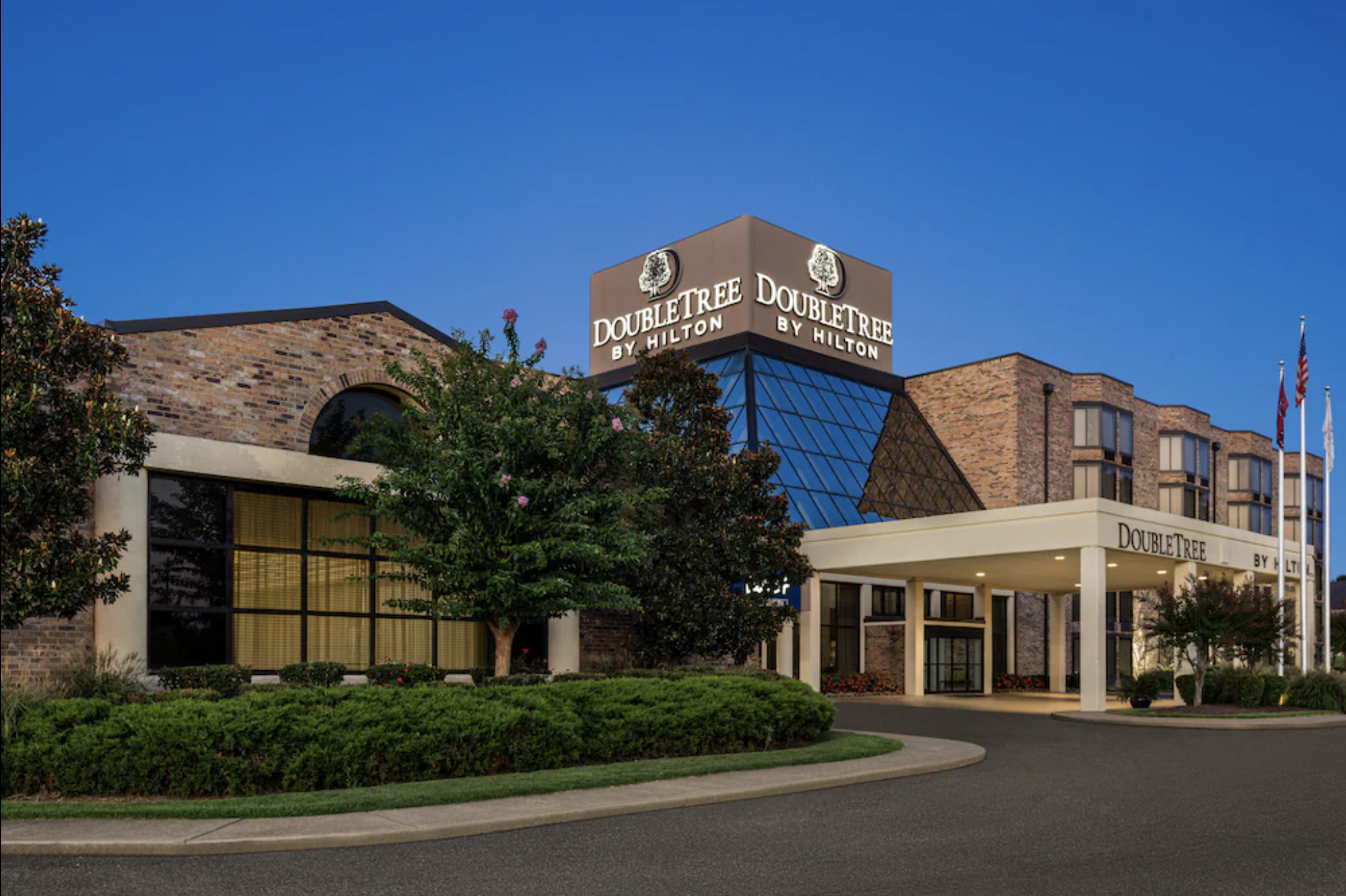
Holiday Inn Express
165 Chaffin Pl, Murfreesboro, TN 37129
(615) 849-9000
To obtain this special rate call the hotel and mentioning you are attending the Southeastern STEM Education Research
Conference at MTSU.
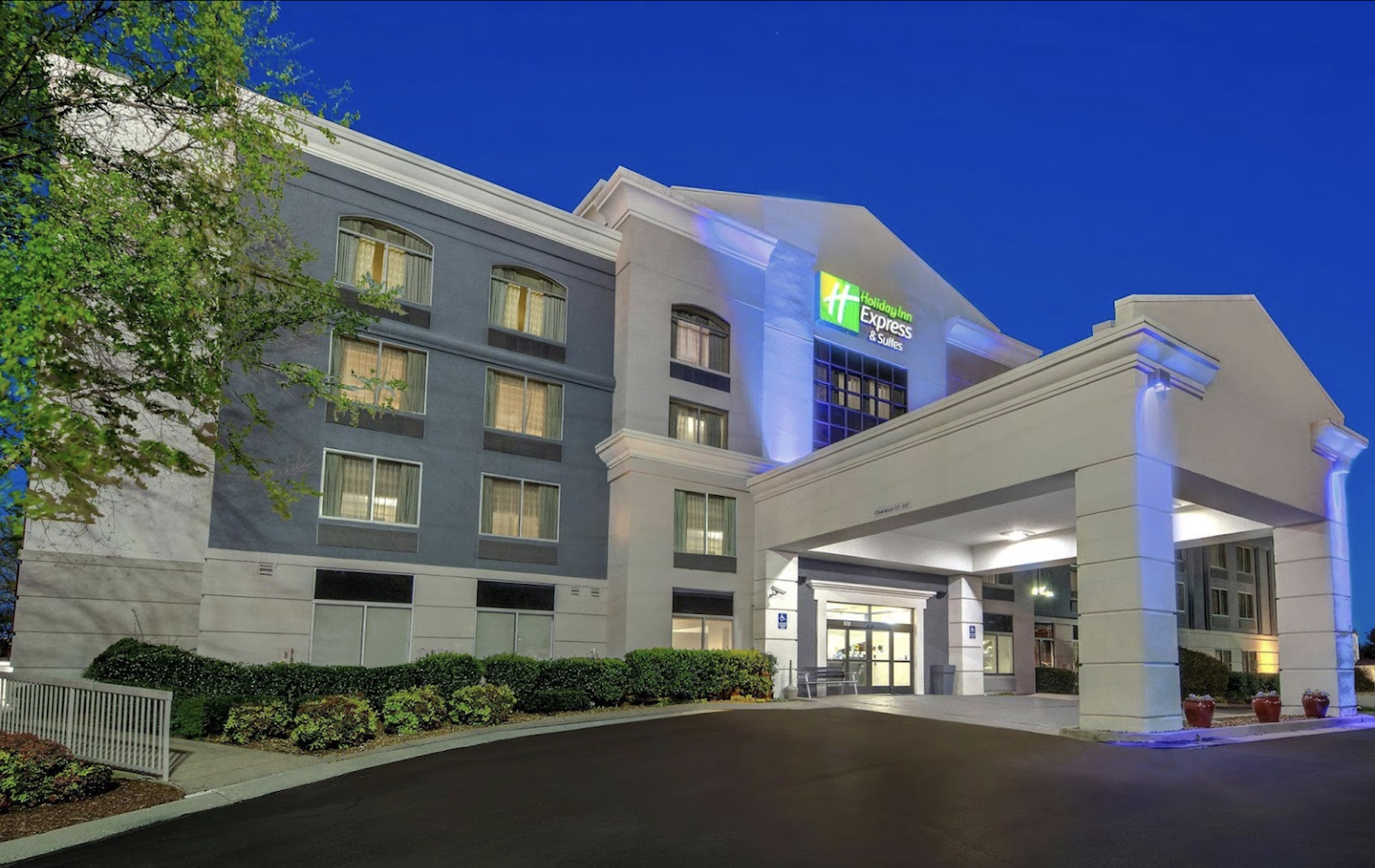
Abstract Submission Information (Currently Closed)
Call for Abstracts - CLOSED
The abstract submission portal, Award Force, opens July 5th. We encourage submissions
across all STEM education research areas, both traditional and emerging, at any educational
level.
Deadlines
S2ERC Abstract Submission Portal is Closed.
The Priority Consideration deadline is September 15th at 11:59 pm CT.
An extended deadline, without priority consideration, is September 29th at 11:59 pm CT.
Instructions
Click here for detailed instructions for submitting your abstract.
Disclaimer: Creating an account on the Award Force website to submit an abstract does NOT register you for attendance at the Southeastern STEM Education Research Conference.
This account is only for submitting your abstract.
Instructions for Submitting Your Abstract
Summary Sheet "How to Register"
- Go to https://mtsuorsp.awardsplatform.com/
- To submit your abstract, you must create an account on the Award Force website by
clicking the purple "Continue" button.
Your email and password will be used to log back into the site. If you have submitted
to the conference previous conferences, using Award Force you already have an account
associated with your email address. If you remember your password, you can login or
click "Reset Password," to gain access to your account.
You MUST go into your email and click on the verification email to continue registering. You
will need to click on the link that is in the email and it will take you back to the
website. Your account is now verified.
- After you have filled out all of the required fields to create an account or logged
into your existing account, you will be taken to a portion of the site that looks
like this:

- Click "Start Application"
- Here you will use the drop down tab under “Event” and select the Southeastern STEM Education Research Conference. Enter your "Title of Proposal." Once this is done, you will be able to fill in your
name and after and click “Save + Next.”
- As you fill out the application, each time you click “Save + next,” your work to that
point is saved to your account. You may begin your application and come back later
to complete it without starting over again. Simply log back into your account using
the email and password you created.

- After providing all required information including about any co-authors and details
about your submission, attach your abstract as a PDF before completing the process
by clicking “Submit Application."

- You have now successfully completed the submission process for Southeastern STEM Education Research Conference 2023 and will be notified when judging is finalized. If you have any questions or problems,
please contact the Tennessee STEM Education Center at MTSU at tsec@mtsu.edu or call our office at 615-904-8573.
Abstract Submission Guidelines
Abstracts should be limited to two single spaced pages, not including references.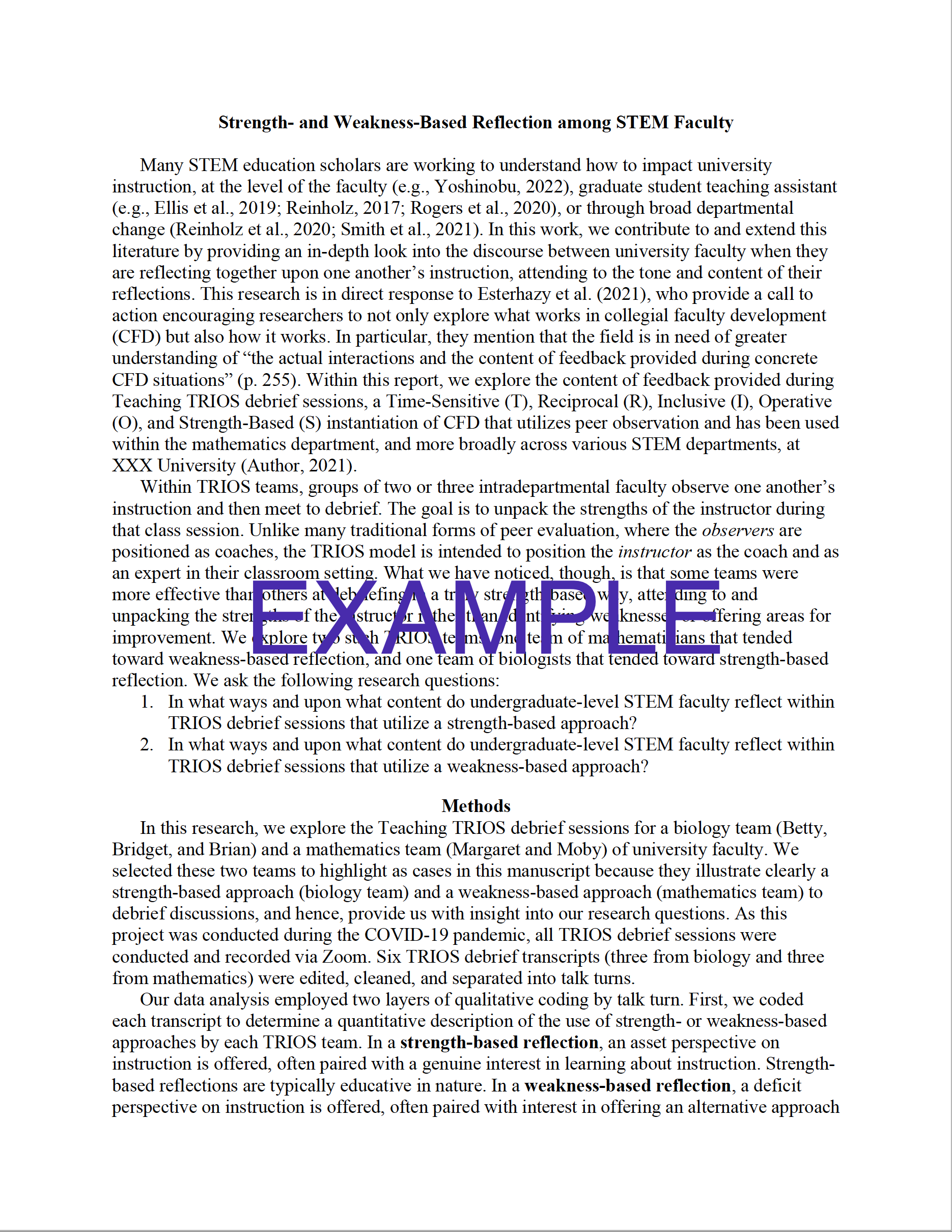
Include in the abstract:
- Brief overview of the background literature
- The significance of the research
- Research question(s), data analysis procedures, and summary of findings.
Please reference the example format seen below to create your abstract submission.
Upload the PDF via the submission link above.
Judging Criteria
Click the image below to view the S2ERC scoring rubric.
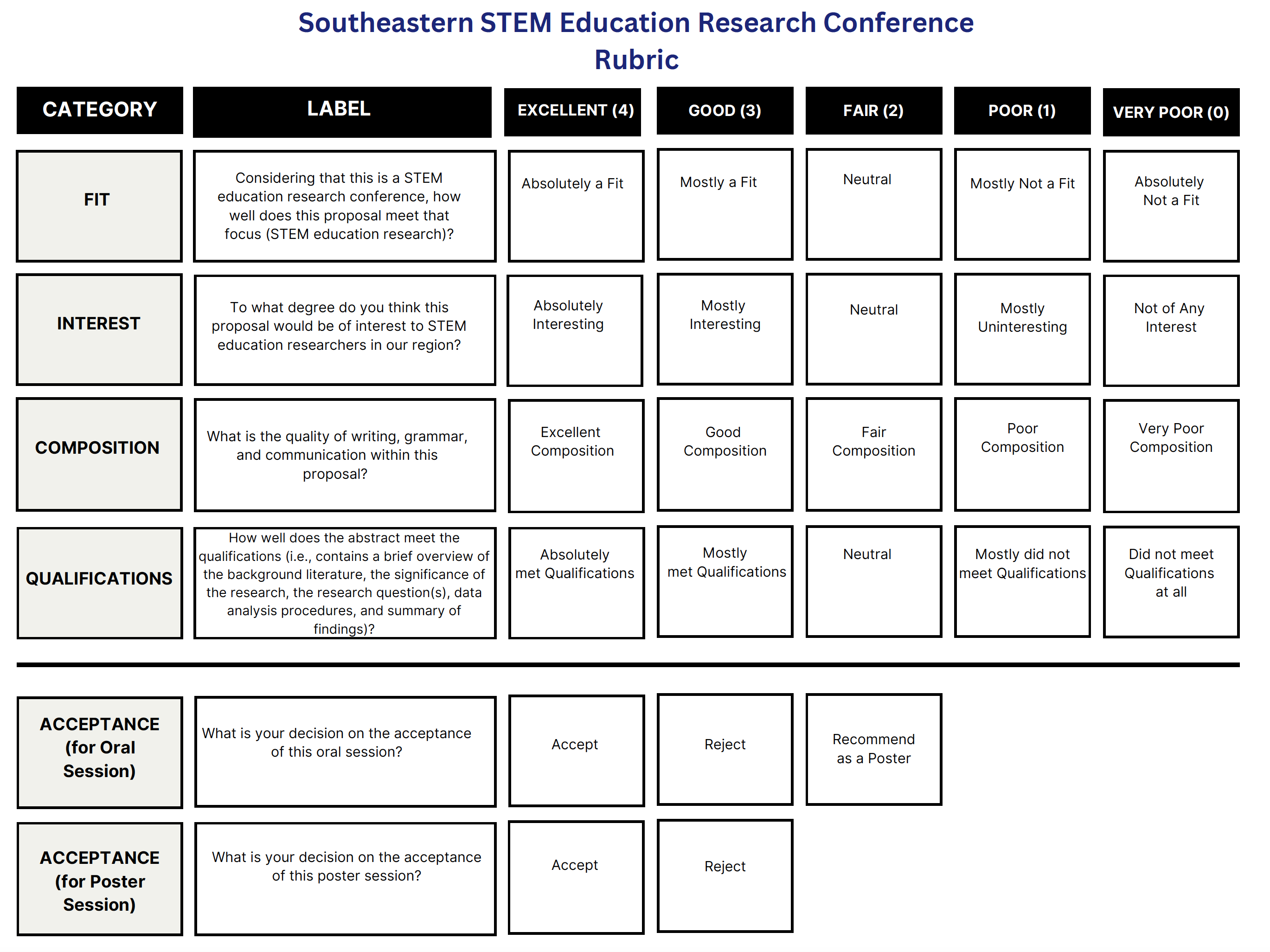
Call for Reviewers! - CLOSED
Volunteer to review abstract submissions for the 2024 Southeastern STEM Education
Reserach Conference. Assignments will be reviewed and scored digitally, at the convenience,
from the comfort of your home or office. Reviewer enrollment window is closed. Thank you! Reviewing is an appreciated service and this event simply would not be possible without you!
Poster Presentation Guidelines
The poster size should be 30” x 40” and can be displayed landscape or portrait. Posters
should NOT be trifold. Posters will be displayed on tripods, which will be
provided. 
Information from the submitted abstracts should be used to guide the content of the
poster. Posters should include the research question, data, findings, and other information
needed to convey research to others. If abstracts are included on the poster, it should
not exceed 200 words in length. Poster text and illustrations should be legible from
a few feet away.
We encourage individuals presenting posters to stand at or near their poster during
the poster session to facilitate discussion and questions. Posters should convey the
research clearly during times the presenter is away.
Oral Presentation Guidelines
Each of the oral presentation sessions are 90 minutes long. There will be three presenters
in each session, given 20 minutes to present and 10 minutes for questions and transition
to the next speaker.
The overall presentation format is up to the presenter. We will have audio/visual
tech capabilities on site.
Event Archives
2023 Southeastern STEM Education Research Conference @ Tennessee Tech University
Meet the Keynote Speaker: Dr. Tessa Andrews
Making the most of active learning: The role of teaching expertise
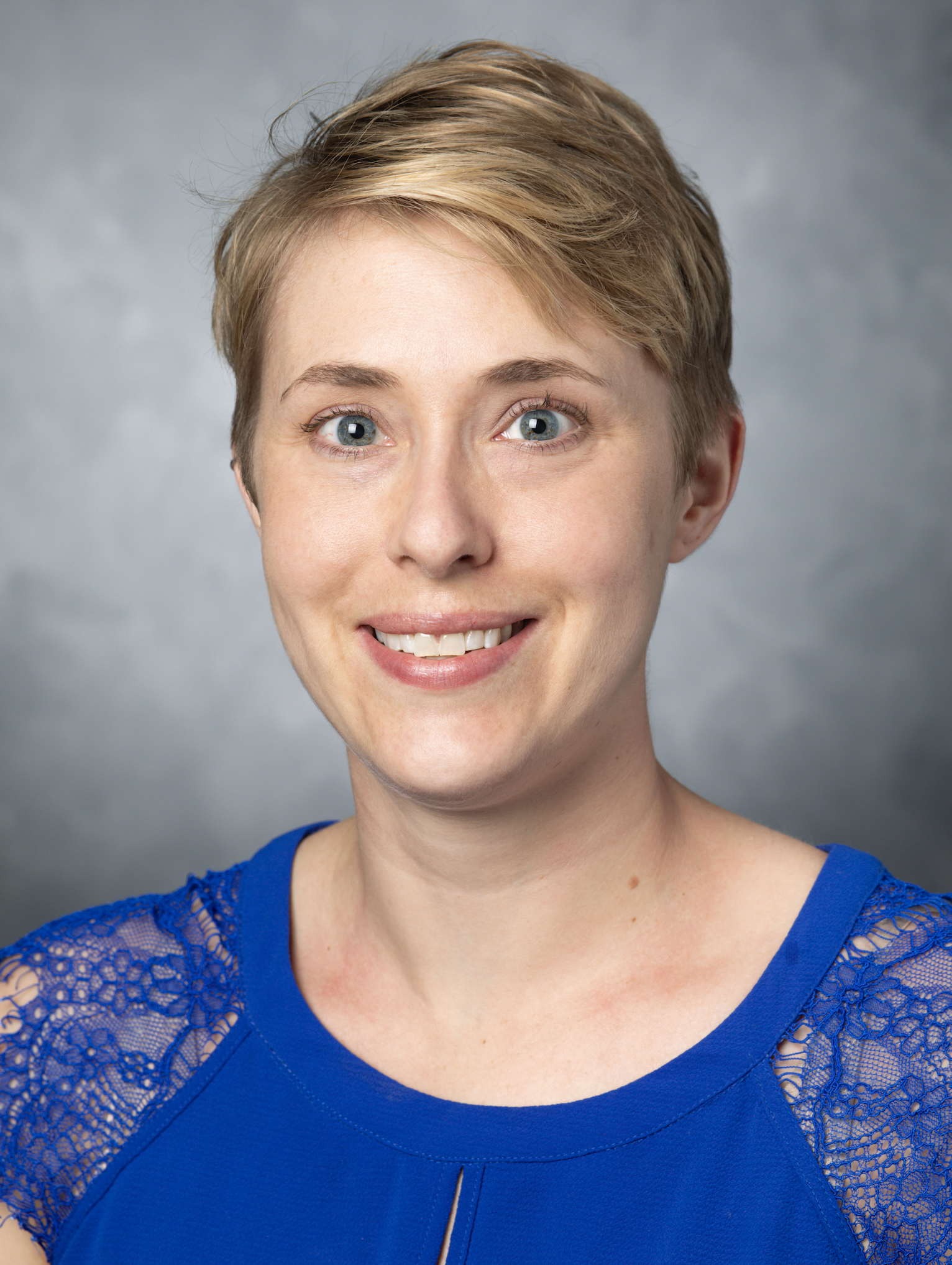
Dr. Andrews’ interactive address, Making the most of active learning: The role of
teaching expertise, will focus on the specialized teaching knowledge that faculty
use to plan and carry out active-learning instruction in large classes. Though active-learning
instruction can be highly effective at supporting student learning and reducing opportunity
gaps, the results instructors achieve vary considerably. Dr. Andrews will present
results from a series of published papers and ongoing research. These results reveal
teaching knowledge that facilitates effective active-learning instruction and teaching
knowledge that may limit the impact of active learning on students.
Bio: Tessa Andrews, PhD, is an Associate Professor of Genetics at the University of Georgia.
She specializes in biology education research and aims for her research to inform
and support the effective and widespread implementation of evidence-based teaching
strategies in undergraduate STEM classrooms. Dr. Andrews studies faculty and the specialized
teaching knowledge they use to plan and carry out evidence-based teaching. She also
studies the systems in which faculty work, such as departments and institutions, and
how these systems can be reformed to better encourage, incentivize, and reward evidence-based
teaching. Dr. Andrews’ work has been funded by multiple grants from the National Science
Foundation, including a CAREER award. Her contributions as a teacher have been recognized
by awards from the Morehead Honors College, University of Georgia, and the University
System of Georgia. Dr. Andrews is a Monitoring Editor for CBE-Life Sciences Education and a Working Group Leader for the Accelerating Systemic Change Network. She earned
a BS in Psychology, a PhD in Biological Sciences, and a Certificate of College Teaching
from Montana State University.
View the Program
*All Presenters, Authors and Attendees must register to attend
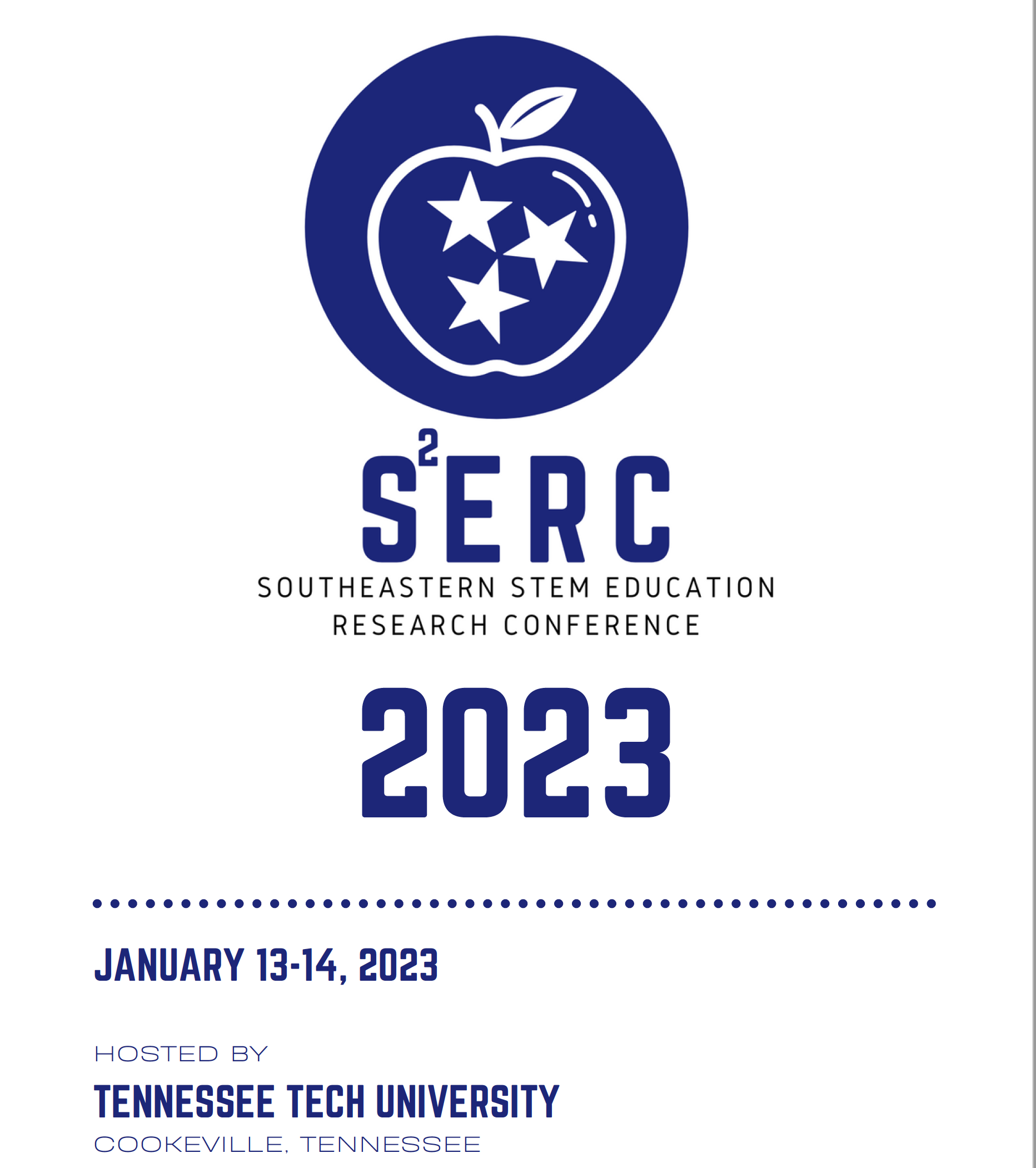
Learn More!
Download & Share
2023 Registration Flyer
2023 Call for Proposals Flyer
2022 Southeastern STEM Education Research Conference @ Middle Tennessee State University
Register for S2ERC
Join the Mailing List
Become a Sponsor
January 13-14, 2022 at Middle Tennessee State University in Murfreesboro, TN

The Tennessee STEM Education Center at MTSU is excited to announce that the name of
our conference is officially changing this year. For the last 15 years, The Tennessee
STEM Education Research Conference has been a place to share research and connect
with other researchers in a meaningful way. As the event has grown, so has the geographical
reach. At the last conference, in January 2021, we had 24 schools from 11 different
states represented. To reflect this and as we expand within the region and beyond,
the committee has decided to change the name to the Southeastern STEM Education Research Conference.
We have debated this name change for several years and hope that it will encourage
broader participation and help bring new voices, ideas, and research to the table.
Thank you for your continued support of STEM education and we look forward to having
you join us at the 2022 conference.
The 16th Annual Southeastern STEM Education Research Conference, formerly the Tennessee STEM
Education Research Conference, will be held Thursday, January 13-Friday, January 14, 2022 at the Middle Tennessee State University Campus in Murfreesboro, TN. This will be an in-person event.
Also, please be aware that the Call for Proposals will be much earlier this year as
to allow more time to prepare posters and presentations. We hope this will make the
proposal process go more smoothly and be more convenient for participants. Expect
the call to go out this summer instead of in the fall.
The goals of this conference include:
- Share current research questions, methodologies, and findings within disciplinary
and interdisciplinary STEM contexts
- Facilitate discussions between researchers and educators
- Promote local, state and national STEM education collaborations and partnerships
- Develop improved teaching methods for STEM topics
- Provide networking opportunities across stakeholder communities
Register for S2ERC
Early Career Panel
We also wanted to draw your attention to the Early Career Panel that will kick off
this year’s conference. We are very excited about this brand new event that is being
sponsored by East Tennessee State University’s Center of Excellence in STEM Education.
One of the priorities of the conference is to be welcoming and beneficial for graduate
students and those who are early in their career. The poster session, which will take
place on Thursday, January 13, 2022, is a part of the conference that often draws
predominately from this category or at least is easily accessible to it. Now, this
Early Career Panel will be an additional event that we hope will be a great way to
kick off the conference. One of the things we hope to encourage through these events
is opportunities to network. We want to bring together people at all different levels
of their career so regardless of where you are, please plan to come to the panel and
the poster session to support and connect with other researchers.
Research
The Southeastern STEM Education Research Conference (S2ERC) is a primary research
dissemination venue for STEM Education researchers and partners. The conference committee
defines research as a process of systematic inquiry that entails collection of data;
documentation of critical information; and analysis and interpretation of that data/information,
in accordance with suitable methodologies set by specific professional fields and
academic disciplines. The committee encourages submissions from educational researchers
within the individual disciplines of science education, technology education, engineering
education, and mathematics education, and is especially interested in submissions
from researchers who are working to cross boundaries between STEM disciplines. A goal
of the conference is to support interdisciplinary collaboration and to foster integrated
STEM education research across the region. We encourage submissions from researchers
studying all levels of STEM education, including preK-12 STEM education, undergraduate
STEM education, and graduate STEM education. Moreover, the conference is intended
as a welcoming environment for feedback and exchange among all levels of STEM education,
including early-career educational researchers and graduate students.
Thank You to Our 2022 Sponsors
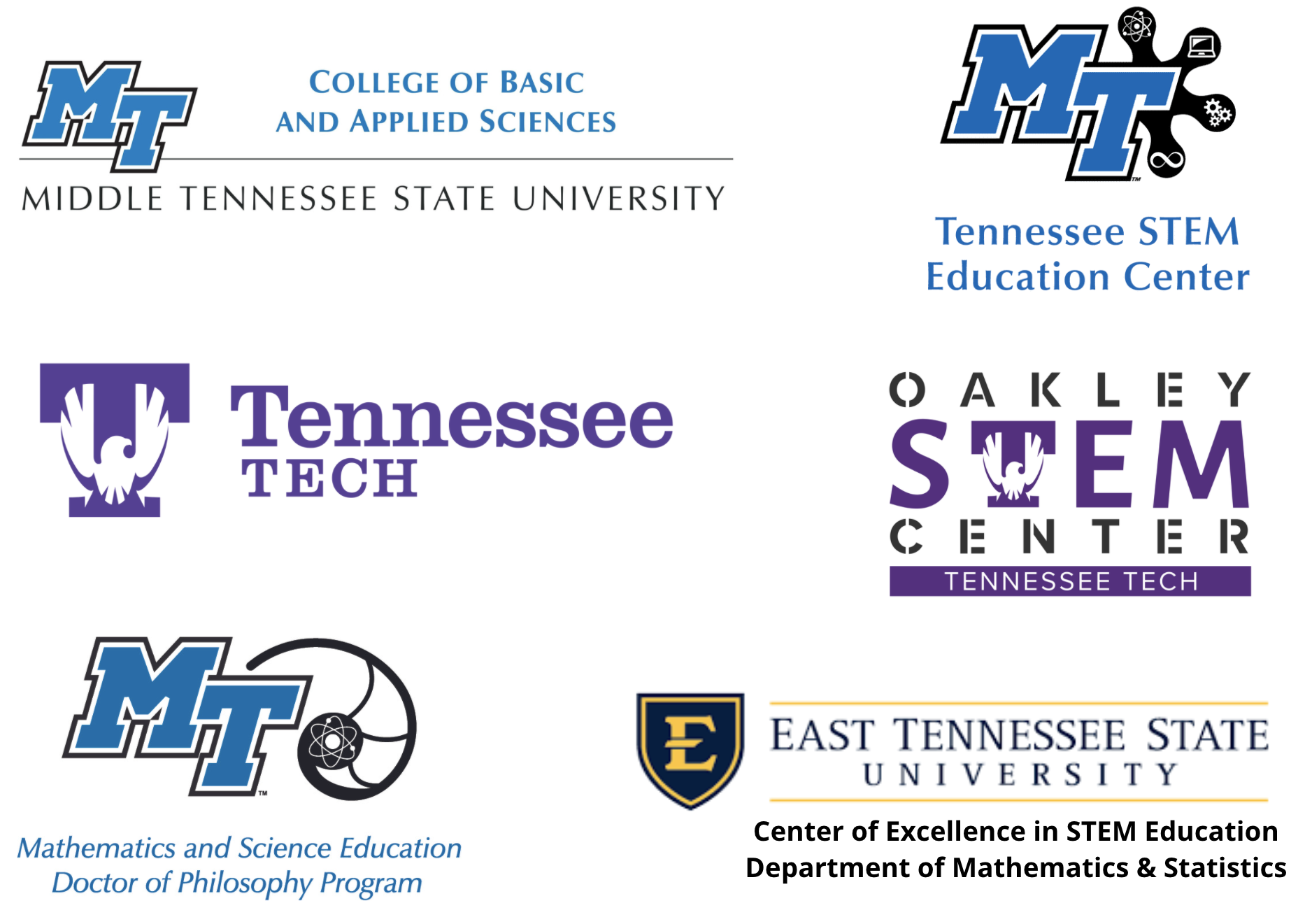
2022 Conference Committee Members
Dr. Gregory Rushton, Tennessee STEM Education Center at MTSU
Ms. Mandy Singleton (Event Coordinator), Tennessee STEM Education Center at MTSU
Dr. Sarah Bleiler-Baxter, Middle Tennessee State University
Dr. Darek Potter, Oakley STEM Center at Tennessee Tech University
Dr. Holly Anthony, Tennessee Tech University
Mr. Carlos Galindo, Oakley STEM Center at Tennessee Tech University
Dr. Mitzy Erdmann, University of Alabama at Birmingham
Dr. Joe L. March, University of Alabama at Birmingham
Dr. Lynn Liao Hodge, University of Tennessee Knoxville
Dr. Joshua M. Rosenberg, University of Tennessee Knoxville
Dr. Cindy M. Lee, Clemson University
Dr. Anant Godbole, East Tennessee State University
Dr. Deborah McAllister, University of Tennessee Chattanooga
Graduate Student Apprentice: Josh Forakis, University of Alabama at Birmingham
Important Links
Parking Information
- Address of main parking lot: 1611 Alumni Drive, Murfreesboro, Tennessee 37130
- You can also enter "walker Library MTSU" into most GPS systems to have it navigate
you to the Correct parking lot on the MTSU campus
- No parking passes are Necessary Because Classes are not in session. As long as fire
lanes, accessible parking, and normal laws, the university will not ticket attendees.
- For those with an accessible parking permit, parking is marked on the map and clearly
marked. Please be sure your tag or placard are visible.
- Follow the signs from the parking lot to the building

A Statement on the Conference Being in Person
We have received an overwhelming amount of emails and calls asking if the conference
will still be in person or if the plans have changed in light of the current Covid
numbers and the new Omicron variant. We have spent much of the first several days
back in the office after the break researching; talking to the committee, attendees,
and different departments at the university; as well as feedback from participants.
We are very aware of the concerns and have made some difficult decisions regarding
the event in response to those concerns. We are changing several aspects of the event
and are suggesting some precautions in order to increase participant safety:
- We strongly encourage everyone to get vaccinated and/or boosted to protect against
infection and against the most severe effects in the event of a breakthrough infection.
- If you are not feeling well or have any of the symptoms for COVID, stay home and do
not attend.
- Although we cannot require masks due to current state laws and university policy,
we urge attendees to wear masks and utilize social distancing whenever possible.
- We have worked diligently with our catering services here at MTSU to pivot from buffets
and food service that is less cautious to individually packaged meals and snacks when
possible. The Thursday evening banquet will now be a grab and go hot meal with multiple
seating options on different levels of the building so there is plenty of room for
social distancing or to take your meal someplace else that you will feel safe eating.
- The keynote speaker will be held in the largest auditorium space in our wonderful,
state of the art Science Building after dinner to allow for mask wearing and social
distancing instead of during the meal where these efforts would be more difficult.
Conference Program
Conference Schedule
Thursday, January 13, 2022
| Registration Opens |
12:00pm |
| Poster Setup |
12:00pm-4:30pm |
| Early Career Panel |
1:00-2:30pm |
| Session 1 |
2:00pm-3:00pm |
| Break |
3:00pm-3:15pm |
| Session 2 |
3:15pm-4:15pm |
| Break |
4:15pm-4:30pm
|
| Poster Session |
4:30pm-6:00pm
|
| Banquet |
6:00pm-9:00pm
|
Friday, January 14, 2022
| Registration Opens |
7:30am |
| Breakfast |
8:00am-9:00am |
| Session 3 |
9:00am-10:30am |
| Break |
10:30am-10:45am |
| Session 4 |
10:45am-12:15pm |
| Lunch |
12:15pm-1:30pm |
| Session 5 |
1:30pm-3:00pm
|
See Full Schedule Here
2022 Keynote Speaker: Marilyn Struchens

Keynote Speaker Sponsored by: Mathematics and Science Education Ph.D. Program at MTSU
Title of the Keynote Address: The Impacts of a Foregrounding Equity Research Agenda
Abstract: Dr. Strutchens’ address will focus on the impacts of conducting equity-based research.
She will discuss the underpinning themes and theories related to her research. She
will also share the major impacts of her and her colleagues’ work on students, teachers,
administrators, mathematics teacher educators, mathematicians, parents, and mathematics
education as a whole. Furthermore, she will discuss how this work has implications
for other STEM fields.
Marilyn Strutchens’ Bio: Marilyn E. Strutchens is an Emily R. and Gerald S. Leischuck Endowed Professor and
a Mildred Cheshire Fraley Distinguished Professor of Mathematics Education in the
Department of Curriculum and Teaching at Auburn University where teaches graduate
and undergraduate courses and serves as the Acting Department Head.
She is the chair of the Advisory Committee for the Directorate for Education and Human
Resources or the National Science Foundation. She is a past Advisory Board Member
for the AAAS initiative --Stimulating Research and Innovation in STEM Teacher Preservice
Education, funded by the NSF Robert Noyce Teacher Scholarships Program. Dr. Strutchens
has also served as a Board Member for the National Council of Teachers of Mathematics
(NCTM) from 2015 -2018, president of the Association of Mathematics Teacher Educators
[AMTE] (2011 –2013) and a member of the Executive Board of Directors for the Conference
Board of Mathematical Sciences (2012 – 2014). She received the 2017 Judith Jacobs
Lectureship from the AMTE.
Dr. Strutchens has participated in several national initiatives, including the NCTM’s
Principles to Actions Toolkits (writing team) and AMTE’s Standards for Preparing Teachers
of Mathematics (writing team). She is the leader for the Clinical Experiences Research
Action Cluster for the Mathematics Teacher Education-Partnership, a coalition of 100
universities organized by the Association of Public and Land-grant Universities to
transform secondary mathematics teacher preparation.
Dr. Strutchens was the Co-PI and co-director of TEAM-Math (Transforming East Alabama
Mathematics). TEAM-Math was a National Science Foundation-funded Math and Science
Partnership between Auburn University, Tuskegee University, and 14 school districts
in East Alabama. She also directed TEAM-Math’s Secondary and Elementary Teacher Leader
Academies funded by NSF’s Noyce program, and the TEAM-Math and AMSTI-AU Professional
Mathematics Learning Communities Partnership.
A major theme of her work is linking research to practice and practice to research.
Her goal has been to conduct research that illuminates what happens in the classroom
to effect positive and equitable change. Her work shows the importance of hearing
the voices of the key constituents involved in the mathematics education of students
and the school, societal, and race/ethnicity factors that influence students’ achievement.
She served as the editor or co-editor for several books including Educating Prospective Secondary Mathematics Teachers, AMTE’s Second Monograph Series, the 2012 special equity issue of the Journal of Mathematics Teacher Education, the National Council of Teachers of Mathematics’ Focus on High School Mathematics: Fostering Reasoning and Sense Making for All Students, and Changing the Faces of Mathematics: Perspectives on African Americans. She has also authored and co-authored numerous book chapters and journal articles.
She has an undergraduate degree in fashion merchandising and a masters’ and Ph.D.
in mathematics education from the University of Georgia.
Instructions for Proposal Submission and Presenter Information
2022 Submissions Are Now Closed
Proposal Submissions are Now Closed
Disclaimer: Creating an account on the AwardForce website to submit an abstract does NOT register you for attendance at the Southeastern STEM Education Research Conference
2022. This account is only for submitting your abstract. Registration to attend the
conference will open in October and must be completed by December 31, 2021 by 11:59
pm CST in order to be included in the program and present at the conference should
your abstract be accepted.
Instructions for Submitting Your Abstract
- Go to https://mtsuorsp.awardsplatform.com/
- To submit your abstract, you must create an account on the AwardForce website by entering
your information in the middle fields as shown below. Your email and password will
be used to log back into the site. If you have submitted to the conference previously,
for either the 2020 or 2021 conferences, using AwardForce you already have an account
associated with your email address. If you remember your password, you can login or
click "Reset Password," to gain access to your account.
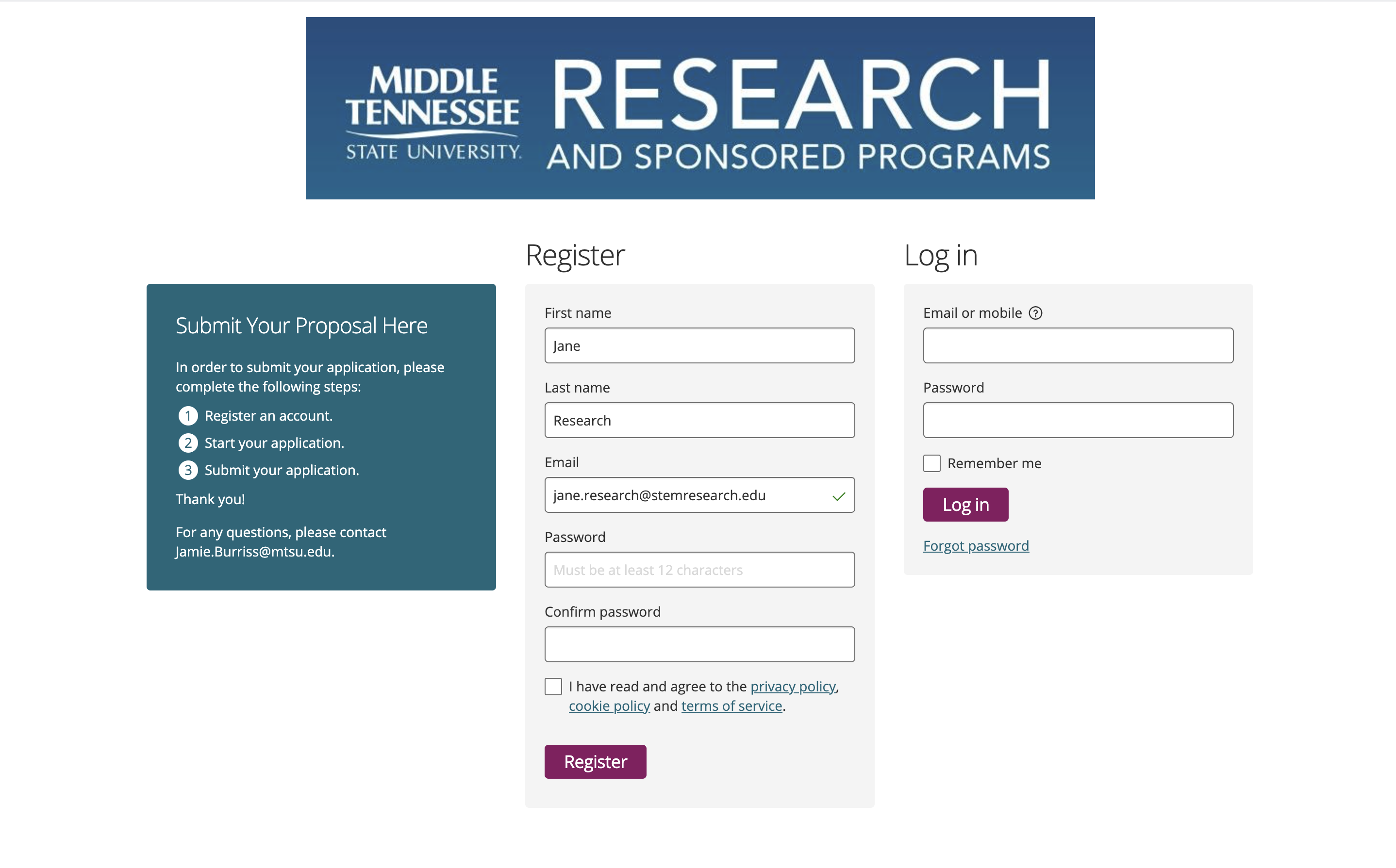
- If you created an account, you will see a notification that looks like this:

You MUST go into your email and click on the verification email to continue registering. You
will need to click on the link that is in the email and it will take you back to the
website. Your account is now verified.
- After you have filled out all of the required fields to create an account or logged
into your existing account, you will be taken to a portion of the site that looks
like this:

- Click "Start Application"
- Here you will use the drop down tab under “Event” and select the Southeastern STEM Education Research Conference 2022. Enter your "Title of Proposal." Once this is done, you will be able to fill in your
name and after and click “Save + Next.”
- As you fill out the application, each time you click “Save + next,” your work to that
point is saved to your account. You may begin your application and come back later
to complete it without starting over again. Simply log back into your account using
the email and password you created.

- After providing all required information including about any co-authors and details
about your submission, attach your abstract as a PDF before completing the process
by clicking “Submit Application."

- You have now successfully completed the submission process for Southeastern STEM Education Research Conference 2022 and will be notified when judging is finalized. If you have any questions or problems,
please contact the Tennessee STEM Education Center at MTSU at tsec@mtsu.edu or call our office at 615-904-8573.
Abstract Guidelines
Abstracts should be limited to between 250-500 words, not including references. Include
in the abstract a brief overview of the significance of the research, the research
question(s), data collected, and a summary of the primary findings.The First Call
for Abstracts deadline is Friday, September 17, 2021 by 11:55pm CST. If there are still presentation slots available, a second call will follow.
Abstract Example
The primary goal of professional development programs is to support teachers in increasing
student achievement. In many cases, this requires a significant change in how mathematics
is taught (Sowder, 2007). In turn, this demands not only a change in teachers’ beliefs
(Pajares, 1992) but also a new vision for what mathematics teaching entails (Ball
& Cohen, 1999). Unfortunately, professional development often fails to support teachers
in making these changes as it does not provide opportunities for teachers to view
reform-oriented teaching practices with students similar to their own (Santagata,
2011).
With this limitation of professional development in mind, we designed our professional
development project to include demonstration lessons. In demonstration lessons, project
participants (who were middle grades mathematics teachers) visited a school site where
a fellow participant taught. Within this participant’s classroom, project staff members
taught mathematics lessons to the participant’s students while visiting project participants
observed the lessons.
Project staff members included mathematics education faculty and graduate students
from the university. Through this experience, project participants not only had the
opportunity to observe reform-oriented teaching practices but also observed this work
with students who were very similar to their own. Project participants attended three
demonstration lessons during a single academic year. Recognizing the unique opportunity
this provided, we sought to document the impact of these demonstration lessons by
gaining insights into the participants’ views. Specifically, the following research
questions were posed.
- 1. How does viewing reform-oriented demonstration lessons impact teacher practice
as reported by teachers?
- 2. What are teachers’ perceptions of the benefits of demonstration lessons in established
classes?
Researchers have indicated that teachers need opportunities to observe reformoriented
instruction (Borasi & Fonzi, 2002; Santagata, 2011). Including observations of reform-oriented
instruction in professional development programs seems to be a logical means for providing
these needed opportunities. The significance of this study rested in its examination
of demonstration lessons as a setting for observing reform-oriented instruction and
the potential demonstration lessons held as a viable option for supporting teacher
learning in professional development.
Five participants were selected for interviews. Interviews consisted of a set of openended
questions that primarily focused on the transfer of information from demonstration
lessons to the individual classrooms of the teachers. Transcripts of the interviews
were analyzed utilizing an open-coding process. Results indicated that observing demonstration
lessons provided participants with a vision of reform-oriented instruction that could
be transferred into their own classrooms. As a result of these observations, participants
reported that they returned to their classrooms with a goal of improving their questioning
techniques and supporting their students in thinking deeply about mathematics. Meeting
this goal was supported by their use of the demonstration lessons.
References
Ball, D. L., & Cohen, D. K. (1999). Developing practice, developing practitioners:
Toward a practice-based theory of professional education. In L. Darling-Hammond &
G. Sykes (Eds.), Teaching as the learning profession: Handbook of policy and practice
(pp. 3–32). San Francisco: Jossey-Bass.
Borasi, R., & Fonzi, J. (2002). Professional development that supports school mathematics
reform. Foundations series of monographs for professionals in science, mathematics,
and technology education. Arlington, VA: National Science Foundation.
Pajares, M. F. (1992). Teachers’ beliefs and educational research: Cleaning up a messy
construct. Review of Educational Research, 62, 307-332.
Santagata, R. (2011). From teacher noticing to a framework for analyzing and improving
classroom lessons. In M. G. Sherin, V. R. Jacobs, & R. A. Philipp (Eds.), Mathematics
teacher noticing: Seeing through teachers’ eyes (pp. 152–168). New York: Routledge.
Sowder, J. T. (2007). The mathematical education and development of teachers. In F.
K. Lester, Jr. (Ed.), Second handbook of research on mathematics teaching and learning
(pp. 157-224). Charlotte, NC: Information Age Publishing.
Poster Guidelines
The poster size should be 30” x 40” and can be displayed landscape or portrait. Posters
should NOT be trifold. Posters will be displayed on tripods which will be provided.
You are responsible for having your poster printed and either foam mounted or purchasing
a foam board to which you can attach your printed poster.
Information from the submitted abstracts should be used to guide the content of the
poster. Posters should include the research question, data, findings, and other information
needed to convey research to others. Abstracts on the poster should be 100-200 words
in length. Poster text should be legible from a few feet away.

We encourage individuals presenting posters to stand at or near their poster for the
duration of the poster session to facilitate discussion and questions. Posters should
convey the research clearly during times the presenter is away.
The Poster Session Will be Thursday, January 13, 2022 from 4:30pm-6:00pm
2022 Hotel Options
These are some of the local hotel options, their distance from the MTSU campus, and
approximate rates. Please consult individual hotels for further information on amenities,
availability, and pricing.
Hilton Garden Inn Murfreesboro
- Distance from MTSU Campus: 4.9 mi
- Address: 1335 Conference Center Blvd, Murfreesboro, TN 37129
- Phone: (615) 225-2345
- Approximate Rate: 1 Bedroom, $123 per night
Embassy Suites by Hilton Nashville SE Murfreesboro
- Distance from MTSU Campus: 5.2 mi
- Address: 1200 Conference Center Blvd, Murfreesboro, TN 37129
- Phone: (615) 890-4464
- Approximate Rate: 1 Bedroom, $150 per night
Residence Inn by Marriott Nashville SE/Murfreesboro
- Distance from MTSU Campus: 7.1 mi
- Address: 1409 Conference Center Blvd, Murfreesboro, TN 37129
- Phone: (615) 225-9250
- Approximate Rate: 1 Bedroom, $194
Holiday Inn Murfreesboro, an IHG Hotel
- Distance from MTSU Campus: 7.1 mi
- Address: 1453 Silohill Ln, Murfreesboro, TN 37129
- Phone: (615) 751-5300
- Approximate Rate: 1 Bedroom, $161.50
Courtyard by Marriot Nashville SE/Murfreesboro
- Distance from MTSU Campus: 4.9 mi
- Address: 1306 Greshampark Dr, Murfreesboro, TN 37129
- Phone: (615) 907-3105
- Approximate Rate: 1 Bedroom, $121 per night
Country Inn & Suites by Radisson
- Distance from MTSU Campus: 3.8 mi
- Address: 2262 Armory Dr, Murfreesboro, TN 37129
- Phone: (615) 890-5951
- Approximate Rate: 1 Bedroom, $85 per night
Fairfield Inn & Suites by Marriott
- Distance from MTSU Campus: 3.6 mi
- Address: 175 Chaffin Pl, Murfreesboro, TN 37129
- Phone: (615) 849-1150
- Approximate Rate: 1 Bedroom, $99 per night
Doubletree by Hilton Hotel
- Distance from MTSU Campus: 3.3 mi
- Address: 1850 Old Fort Pkwy, Murfreesboro, TN 37129
- Phone: (615) 895-5555
- Approximate Rate: 1 Bedroom, $108 per night
Holiday Inn Express
- Distance from MTSU Campus: 3.6 mi
- Address: 165 Chaffin Pl, Murfreesboro, TN 37129
- Phone: (615) 849-9000
- Approximate Rate: 1 Bedroom, $109 per night
Tru by Hilton
- Distance from MTSU Campus: 3.8 mi
- Address: 909 N Thompson Ln Bldg B, Murfreesboro, TN 37129
- Phone: (615) 895-3636
- Approximate Rate: 1 Bedroom, $104 per night
Best Western Chaffin Inn
- Distance from MTSU Campus: 4.8 mi
- Address: 168 Chaffin Pl, Murfreesboro, TN 37129
- Phone: (615) 895-3818
- Approximate Rate: 1 Bedroom, $129 per night
Agenda




























